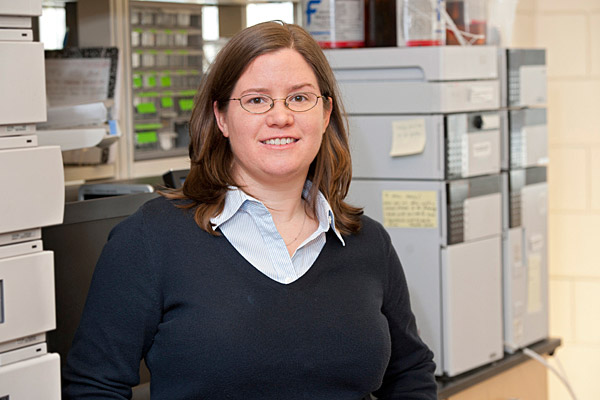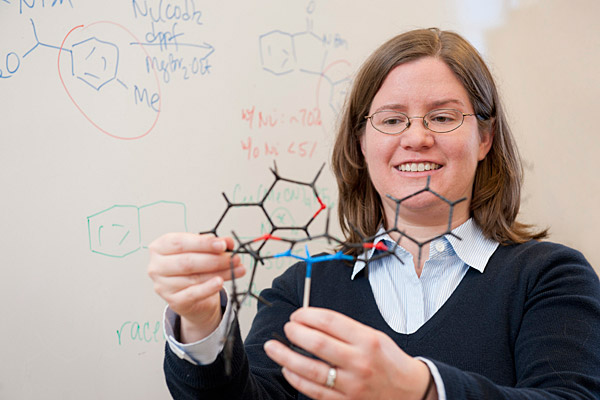


NSF Career Award
UD chemist Watson recognized for research on molecule construction
3:40 p.m., March 1, 2012--Mary Watson, assistant professor in the Department of Chemistry and Biochemistry at the University of Delaware, has received a prestigious Faculty Early Career Development Award from the National Science Foundation (NSF) to support her research on the development of new methods to construct organic molecules.
The highly competitive award recognizes junior faculty for their role as teacher-scholars and is given to those scientists and engineers considered most likely to become the academic leaders of the 21st century. The NSF Career Award, which includes a $550,000 grant, will support Watson’s research on new synthetic methods at UD and her education program to make chemistry more exciting and accessible to potential young scientists.
Honors Stories
National Medal of Science
Warren Award
“Synthetic organic molecules have enormous positive impact on our daily lives, improving everything from our health (medicines) to our entertainment (organic light-emitting diodes, or OLEDs). Future advances rely on increased and more efficient access to complex molecules from simple and readily available building blocks,” Watson said.
“The overarching goal of my research program is to discover new ways to make important molecules using catalysts that enable currently impossible transformations and exert exquisite control over which enantiomer, or geometrical isomer, of product is formed.”
Enantiomers are pairs of chemical compounds, each with a molecular structure that's the mirror image of the other compound in the pair. Controlling which enantiomer is formed is important, Watson said, because enantiomers can exhibit different properties and effects, particularly in biological applications such as medicines.
“The Career proposal will specifically support my research on the development of new ways to make single enantiomers of oxygen-containing heterocycles (cyclic molecules with oxygen atoms in the ring)," she said, adding that heterocycles are found in a variety of bioactive molecules, including vitamin E.
"We will do this by adding carbon-containing groups to oxocarbenium ions, which are a special class of reactive molecules. Controlling which enantiomer is formed in additions to these reactive molecules is a longstanding challenge in chemistry. We have discovered a novel solution to this problem using metal-based catalysts and are excited to pursue our initial discovery by showing that this is a general solution to this synthetic problem.”
In addition to the new reaction technologies that will emerge from this work, Watson’s research program provides opportunities for undergraduate and graduate students interested in pursuing careers in science.
“One of the best parts of being a chemistry professor is working with a dynamic team of energetic young researchers," she said. "My group is incredibly dedicated in our efforts to develop useful new synthetic methods. They worked hard to establish the feasibility of our new method and were exceptional in helping to perfect the Career proposal. It is an amazing privilege to work with such bright, enthusiastic and determined co-workers.”
While she is mentoring others in her research group, Watson also thanked those who have supported her: “I receive exceptional mentorship from my senior colleagues in the Department of Chemistry and Biochemistry, particularly Prof. Joe Fox. Joe has been actively mentoring me since I started at UD; his mentorship put me on track to win this award.”
The award will also fund new initiatives to encourage Delaware high school students to consider careers in science. In announcing the award, the NSF noted Watson's efforts "to inspire Delaware high school students with the power of chemistry using a video she produced about [former UD Prof.] Richard Heck's Nobel Prize-winning achievements and by performing demonstrations in Delaware high schools."
The video, produced with Kyle Chappell of University Media Services, “Discovery and Achievement: Richard Heck’s Contribution to Science and the World,” can be used by high school teachers in their classrooms to get students excited about how important chemistry is, Watson said.
With the support of the NSF, she said, "My research group and I will perform demonstrations in Delaware high schools to show students the types of reactions Heck developed and that we’re working on now. I’m also excited for the opportunity to institute new peer-led team learning (PLTL) workshops in organic chemistry as part of this Career award.”
Photos by Evan Krape









